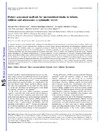Identificador persistente para citar o vincular este elemento:
https://accedacris.ulpgc.es/jspui/handle/10553/44742
| Título: | Dietary assessment methods for micronutrient intake in infants, children and adolescents: a systematic review | Autores/as: | Ortiz-Andrellucchi, Adriana Henríquez Sánchez, Patricia Sánchez-Villegas, Almudena Peña Quintana, Luis Mendez, Michelle Serra-Majem, Lluís |
Clasificación UNESCO: | 3206 Ciencias de la nutrición | Palabras clave: | Infants Children Adolescents Dietary Assessment Methods Systematic Review, et al. |
Fecha de publicación: | 2009 | Publicación seriada: | British Journal of Nutrition | Resumen: | A systematic literature search identified studies validating the methodology used for measuring the usual dietary intake in infants, children and adolescents. The quality of each validation study selected was assessed using a European micronutrient Recommendations Aligned-developed scoring system. The validation studies were categorised according to whether the study used a reference method that reflected short-term intake ( < 7 d), long-term intake ( > or = 7 d) or used biomarkers. A correlation coefficient for each nutrient was calculated from the mean of the correlation coefficients from each study weighted by the quality of the study. Thirty-two articles were included in the present review: validation studies from infants (1-23 months); child preschool (2-5 years); children (6-12 years); adolescents (13-18 years). Validation of FFQ studies in infants and preschool children using a reference method that reflected short-term intake showed good correlations for niacin, thiamin, vitamins B6, D, C, E, riboflavin, Ca, K, Mg, Fe and Zn (with correlations ranging from 0.55 for vitamin E to 0.69 for niacin).Regarding the reference method reflecting short-term intake in children and adolescents, good correlations were seen only for vitamin C (r 0.61) and Ca (r 0.51). Using serum levels of micronutrient demonstrated that the 3 d weighed dietary records was superior to the FFQ as a tool to validate micronutrient intakes. Including supplement users generally improved the correlations between micronutrient intakes estimated by any of the dietary intake methods and respective biochemical indices. | URI: | https://accedacris.ulpgc.es/handle/10553/44742 | ISSN: | 0007-1145 | DOI: | 10.1017/S0007114509993163 | Fuente: | British Journal of Nutrition [ISSN 0007-1145], v. 102 (sup. 1), p. S87-S117, (Diciembre 2009) |
| Colección: | Artículos |
Citas SCOPUSTM
69
actualizado el 08-jun-2025
Citas de WEB OF SCIENCETM
Citations
70
actualizado el 22-feb-2026
Visitas
235
actualizado el 15-ene-2026
Descargas
222
actualizado el 15-ene-2026
Google ScholarTM
Verifica
Altmetric
Comparte
Exporta metadatos
Los elementos en ULPGC accedaCRIS están protegidos por derechos de autor con todos los derechos reservados, a menos que se indique lo contrario.
